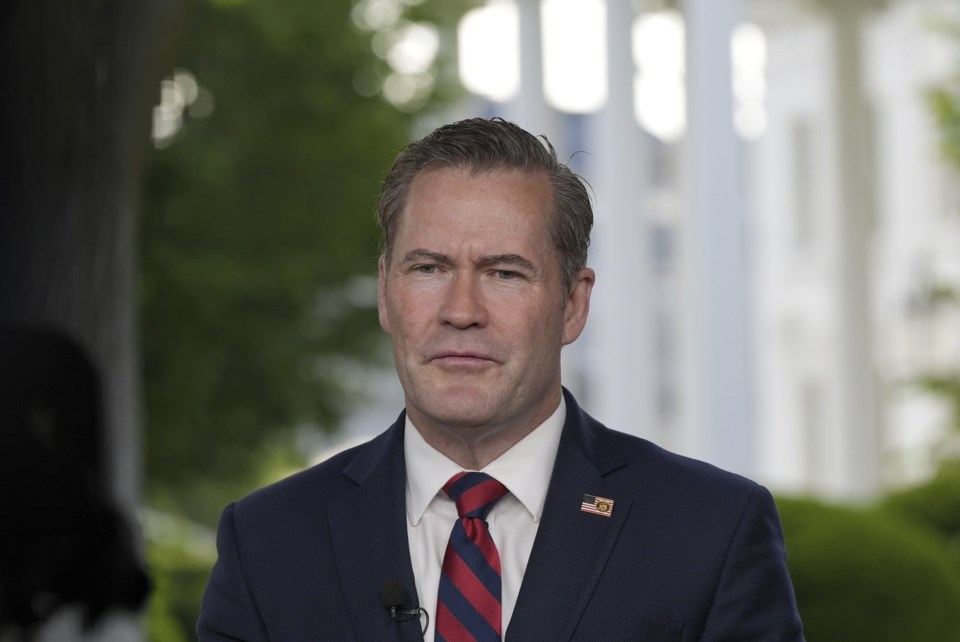WASHINGTON (AP) — President Donald Trump said Thursday he's nominating his national security adviser Mike Waltz to serve as United Nations ambassador in a major shake-up of his national security team.
The president said Secretary of State Marco Rubio will serve simultaneously as acting national security adviser while maintaining his position at the State Department.
Trump announced the moves shortly after news broke that Waltz was leaving the administration, just weeks after it was revealed that he had added a journalist to a Signal chat being used to discuss military plans.
“I am pleased to announce that I will be nominating Mike Waltz to be the next United States Ambassador to the United Nations. From his time in uniform on the battlefield, in Congress and, as my National Security Advisor, Mike Waltz has worked hard to put our Nation’s Interests first,” Trump wrote on social media.
“In the interim, Secretary of State Marco Rubio will serve as National Security Advisor, while continuing his strong leadership at the State Department. Together, we will continue to fight tirelessly to Make America, and the World, SAFE AGAIN.”
There is precedent for the secretary of state to serve simultaneously as national security adviser. Henry Kissinger held both positions from 1973 to 1975.
Waltz came under searing scrutiny in March after revelations that he added journalist Jeffrey Goldberg to a private text chain on the encrypted messaging app Signal, which was used to discuss planning for a sensitive March 15 military operation against Houthi militants in Yemen.
Trump’s decision to move Waltz to the U.N. comes weeks after he pulled his pick for the job, Rep. Elise Stefanik of New York, from consideration.
Stefanik went through a confirmation hearing, but her nomination was pulled in March because her vote to advance Trump’s agenda remains crucial to Republicans in the House.
“I’m deeply honored to continue my service to President Trump and our great nation,” Waltz said of the nomination.
A far-right ally of the president, Laura Loomer, had been targeting Waltz, telling Trump in a recent Oval Office conversation that he needs to purge aides who she believes are insufficiently loyal to the “Make America Great Again” agenda.
Waltz served in the House representing Florida for three terms before being tapped for national security adviser.
In his second term, the Republican president had been looking to avoid the tumult of his first four years in office, during which he cycled through four national security advisers, four White House chiefs of staff and two secretaries of state.
The Signal chain episode also showed that Defense Secretary Pete Hegseth provided the exact timings of warplane launches and when bombs would drop. Waltz had previously taken “full responsibility” for building the message chain and administration officials described the episode as a “mistake” but one that caused Americans no harm. Waltz maintained that he was not sure how Goldberg ended up in the messaging chain, and insisted he did not know the journalist.
Trump and the White House — which insisted that no classified information was shared on the text chain — have stood by Waltz publicly throughout the episode. But the embattled national security adviser was also under siege from personalities such as Loomer, who had been complaining to administration officials that she had been excluded from the vetting process for National Security Council aides.
In her view, Waltz relied too much on “neocons” — referring to hawkish neoconservatives within the Republican Party — as well as others who Loomer argued were “not-MAGA-enough” types.
As reports began to circulate that Waltz could be leaving the administration, Loomer appeared to take credit in a post on the social media site X, writing: “SCALP.”
“Hopefully, the rest of the people who were set to be fired but were given promotions at the NSC under Waltz also depart,” Loomer wrote in another post.
Loomer had taken a similar victory lap when several other NSC officials were dismissed last month one day after she met with Trump.
Questions are also swirling around Hegseth and his role in the Signal chat.
While Waltz set it up, Hegseth posted times for aircraft launches and bomb drops into the unsecured app and shared the same information with dozens of people in a second chat, including his wife and brother.
The Associated Press reported that Hegseth also bypassed Pentagon security protocols to set up an unsecured line for a personal computer in his office –- beside terminals where he was receiving classified information. That raises the possibility that sensitive information could have been put at risk of potential hacking or surveillance.
The Pentagon inspector general is investigating Hegseth’s use of Signal, and he has faced criticism from Democrats and even some Republicans. It has added to the turmoil at the Pentagon at a time when Hegseth has dismissed or transferred multiple close advisers. Nonetheless, Trump has maintained public confidence in Hegseth.
Waltz shift from national security adviser to U.N. ambassador nominee means he will now have to face the Senate confirmation process he was able to avoid January.
The process, which proved to be difficult for a number of Trump’s Cabinet picks, will give lawmakers, especially Democrats, the first chance to grill Waltz on his decision to share information about an imminent U.S. airstrike on Signal. The group chat, which Waltz created, included several high-level Trump administration officials and the editor-in-chief of The Atlantic magazine.
—-
Associated Press writer Tara Copp and Matthew Lee contributed to this report.
Zeke Miller, Aamer Madhani, Seung Min Kim And Farnoush Amiri, The Associated Press



